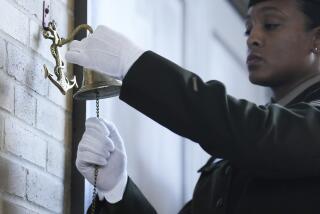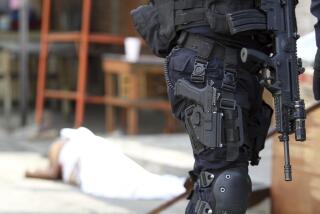Soldiers Rebuked in Corpse Burning
- Share via
WASHINGTON — U.S. soldiers involved in burning the bodies of Taliban rebels in southern Afghanistan and in a psychological warfare operation to taunt surviving fighters will be given reprimands but not face prosecution, the military said Saturday.
News reports of the matter, which occurred last month, stirred complaints in Afghanistan and elsewhere. Some suggested the actions might have violated the Geneva Convention’s rules on the treatment of enemy dead.
But U.S. investigators concluded that the corpses of the two dead Taliban fighters had been burned for reasons of hygiene, which is permitted under the Geneva Convention, and that the American soldiers were not familiar with Islamic beliefs prohibiting cremation.
The investigation found that the burning of the bodies and the broadcasting of the taunts were separate incidents. Two soldiers involved in cremating the bodies and two others who took part in the psychological warfare operation received the reprimands.
Army Maj. Gen. Jason Kamiya, the commander of the U.S.-led coalition in Afghanistan, announced the results of the investigation at a briefing in Kandahar, Afghanistan. His office posted a summary of the report on the Web. The Army did not release the names of any of the soldiers involved.
The report said the incident was not criminal, but illustrated poor judgment and a lack of knowledge of Afghan culture.
The military began its investigation after Australian television aired a videotape showing U.S. soldiers standing around a fire while two of them goaded militants in the area to “come and fight like men.” The report of the broadcast also prompted Afghanistan President Hamid Karzai to order his own inquiry.
The events took place Oct. 1 near the village of Gumbad, in Kandahar province, an area of militant activity. The day before, two Taliban fighters had been killed during a firefight around a rocky hilltop, a skirmish that also left one U.S. soldier and one Afghan soldier dead. A day later, the bodies of the Taliban fighters were still there.
“The weather was hot, the remains were heavily damaged by gunfire, laying exposed for over 24 hours and beginning to rapidly decompose,” the report said. “The unit planned to remain on that hill for 48 to 72 more hours and thus made the decision to dispose of the remains in this manner for hygiene reasons only.”
It said the Army officer who ordered the cremations did so unaware that his commanding officer was meeting with villagers to get the bodies removed.
This was the first time the unit involved had to deal with enemy dead under such circumstances, and investigators found “that there was no intent to desecrate, only to hygienically dispose of the enemy remains.”
But members of an Army psychological warfare team heard about the incident over military radio and decided to use it to provoke the Taliban fighters who had survived the skirmish into showing themselves. Two broadcasts were made over loudspeakers, directed toward the village and an adjacent mountainous area where the fighters were believed to be hiding.
It is not clear whether the broadcasts had any effect, but investigators said the use of the incident for such purposes violated standing orders.
In addition to reprimands, the two soldiers involved in the psychological warfare and their unit commander were reassigned, the report said.
“The criminal investigation revealed that there was no evidence to substantiate that the remains were burned for the purpose of providing content for the loudspeaker message,” said the report, which called them “two separate but related incidents.”
More to Read
Sign up for Essential California
The most important California stories and recommendations in your inbox every morning.
You may occasionally receive promotional content from the Los Angeles Times.













